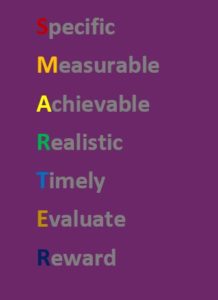SMART-ER Goal Setting for 2019
I remember one of the first professional development courses that I ever took . . . it was all about setting goals and using the SMART technique. It’s hard to believe that 25 years later, I still use this method with my clients when they are looking to set personal and professional goals. At this time of year – after all it’s the beginning of January – we’re all making resolutions. Are we setting goals that set us up for success or failure? Let’s review SMART-ER, which adds a unique twist to the traditional SMART.

When goals are specific, they are clear and well defined, rather than ambiguous or subject to interpretation. I may have goal to do more self-care in 2019. If self-care is not clearly defined, I will have a harder time reaching my goal. Self-care could mean yoga or spa days or mediation or walks in the park. When I am specific about the action that I need to take, I increase the likelihood of doing the action.
Measurable goals are clear about the end state so there is no doubt when the goal has been reached. If I am going to improve my financial situation in 2019, a measurable goal would be, for example, to save $2,500 in the year towards a vacation. This could be broken down to $50 per week added to savings. Another goal could be to eliminate credit card debt, which could mean paying down debt by $200 per month. At the end of each week/month it is clear whether the goal has been accomplished or not.
Goals that are achievable set us up for success rather than failure. While it is great to raise the bar high, the bar should be at a level that stretches us but does not cause an injury. We should be able to achieve the goals that we set out for ourselves. In my example above, the demands of job and family may not allow for two nights out per week for a yoga & meditation class. In this case, I will lose motivation very quickly when I see I am not accomplishing what I set out to do. A more realistic goal might be one evening out per week, perhaps alternating between yoga and meditation classes.
 Realistic goals are within reach, whether that means having the time, money or other resources to attain them. There is no point in setting a goal to travel the world, if your budget cannot afford it.
Realistic goals are within reach, whether that means having the time, money or other resources to attain them. There is no point in setting a goal to travel the world, if your budget cannot afford it.
When goals are timely, we give ourselves some boundaries for reaching the goal. And it means that we have committed to a date by which will complete what we set out to do. Deadlines are what move us to action, so putting some time parameters around our goals will increase our chances of attaining them.
I’ve added ER to the end of SMART. E is for evaluate and R is for reward. Periodic evaluation of progress is important because it is an acknowledgement of where we’re at. And if we’ve set goals properly, then we will easily be able to evaluate progress. If we are on track, we can celebrate, and if we have slipped, then it’s a reminder to get back on track!
 It is so important to recognize accomplishments on a regular basis, and reward successes. Breaking down a goal into smaller chunks creates milestones, and milestones are an opportunity to celebrate the progress towards the bigger goal, at regular intervals. Rewards also act as reinforcements and motivate us to continue on, especially when we may reach a plateau or start to become disinterested.
It is so important to recognize accomplishments on a regular basis, and reward successes. Breaking down a goal into smaller chunks creates milestones, and milestones are an opportunity to celebrate the progress towards the bigger goal, at regular intervals. Rewards also act as reinforcements and motivate us to continue on, especially when we may reach a plateau or start to become disinterested.
“Many people fail in life, not for lack of ability or brains or even courage, but simply because they have never organised their energies around a goal.” Elbert Hubbard.
So if you’re committed to making some positive changes in 2019, why not be SMART-ER about it? Transformative change cannot be achieved by striving for mediocrity. However, setting goals that stretch you outside of your comfort zone to “reach for the stars” is not easy. If you want to set great goals that will set you up for success, but are struggling, let me help!

